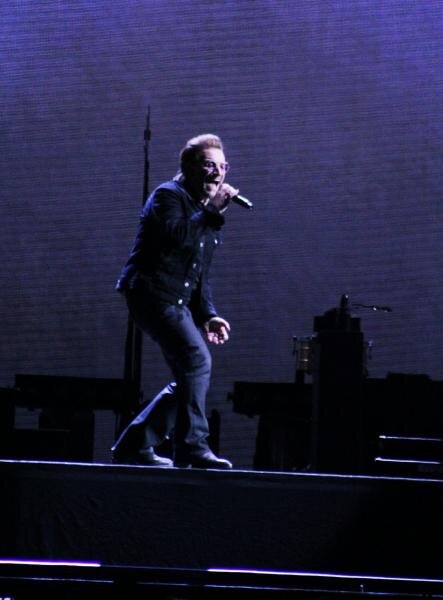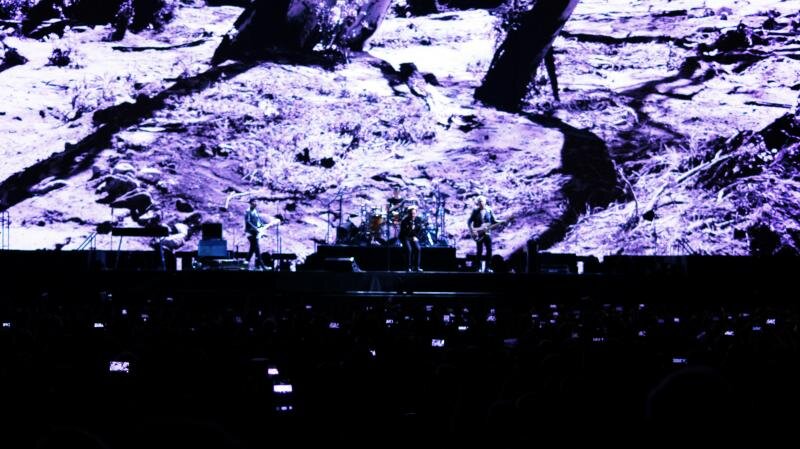U2 Shows the Limits of "Joshua Tree" and the Strength of the Band at Superdome
More than 30 years into its career, U2 could still find real moments, but the staged ones were powerful too.
[Updated] Let’s clear the basics out of the way first. U2 were really good and at times thrilling at the Mercedes-Benz Superdome Thursday night. Musically, they’re a machine that at times sounds like one instrument behind Bono, which means they always seem in step with each other. And Bono is a genuine rock star. When he stood alone on the stage located about 20 feet into the audience, he seemed most at home. The space and an audience close enough to touch clearly energized him. When the pieces come together just right, the hopeful yearning for something bigger and better at the core of so many U2 songs feels itself spiritual and certainly ennobling. In lesser moments, they’re simply very good songs, played as well as they could be played Thursday night.
But there was more to think about Thursday night than just did we have fun or not. Really, as long as U2 didn’t out and out suck, the audience was going to have fun and like the show, particularly since it included The Joshua Tree played in its entirety. I’ve become less sold on album shows because they rarely pay off the way you hope. When The Psychedelic Furs toured Talk Talk Talk, it was great to hear “Into You Like a Train” and “Mr. Jones,” but I couldn’t ignore how thin side two was. When Lucinda Williams played her self-titled album from 1988, it was clear that she could no longer be the woman who performed those songs and the set felt like one by a well-meant cover band.
In concert, The Joshua Tree’s soft spots showed as well. The last songs of side one tread on trod ground after “Where the Streets Have No Name,” “I Still Haven’t Found What I’m Looking For,” “With or Without You,” and “Bullet the Blue Sky,” and I never need to hear the album-closing “Mothers of the Disappeared” again. Live, I’d argue that “I Still Haven’t Found What I’m Looking For” flags a bit as well and requires Bono to sell it hard, but it might just paled next to “Where the Streets Have No Name.” That song moved with a hard, motorik intensity that could have stretched out for another three or four exhilarating minutes before anyone would notice.
During The Joshua Tree portion of the show, it was hard not to think about what the performance means today. The album was the moment when U2 became U2, with the band at the height of its infatuation with the idea of America. This tour comes at a time when the notion feels genuinely up for grabs. Bono was becoming Bono, merging Ginsberg, Kerouac, Steinbeck and Selby with Christian spirituality, and he’s singing those songs on this tour when we have a president without a speck of poetry in his soul. The album presents U2 at its most forthright, fighting irony like cancer. Now we’re in a time when nothing seems solid, which makes The Joshua Tree the feelgood album for the moment and the tour a celebration of a vision of America diametrically opposed espoused by The White House.
As I left, one man groused, “I didn’t like his politics, but I sure liked his music,” and he wasn’t the only one to say so. It’s hard to imagine in 2017 that Bono’s politics are surprising, and it’s even harder to imagine what people took exception to. Throughout the show, U2 preached the soft gospel of coming together and respecting each other, finding common ground. Bono wished Steve Scalise a speedy recovery and spoke up for civil rights, including the right to live where you want to live (That might be one to set off Angry Guy) and women rewriting history (That might be another). Even in those instances Bono framed the issues as being pro-wives and daughters and pro-homes. Who’s enough of a dick to be against those? This guy, evidently, but to be fair, he got mad at his kids when leaving because they went down the stairs so quickly that if his wife slipped, she’d have no one to fall on.
The night started on a stage out in the audience with a short set that included “Sunday Bloody Sunday,” “New Year’s Day,” “Bad” and “Pride (In the Name of Love),” and of those, “Bad” created the most from the least. The seemingly simple song grew in intensity until it became monstrous, and it shrank back to human proportions as easily as it swelled up. It was the first of a number of songs in the night that could have gone on for as long as the band wanted to play them. “Beautiful Day,” “Elevation,” and “Vertigo” don’t have natural endings either, and U2 clearly has had a lot of practice riding those songs’ waves until they had to find ways to shut them down.
After performing unadorned on the satellite stage, the members returned to the main stage to play The Joshua Tree with videos by Anton Corbijn backing them. His work was often beautiful, but one of the most striking visual moments came during “Running to Stand Still.” Bono fixed a black and white video camera to a stand in front of him, and the extreme contrast made the lines in his face show the thirtysomething years he has put in the business. More than seeming brave though, the effect played like the price of being a front man, where sometimes you’re going to look crazy, sometimes you’re going to look cool, and sometimes you’re going to look old. It was a reminder of how rarely the show dealt with the band members as people. The only time Bono talked about their lives was when he drew attention to The Edge’s work with Music Rising to help get instruments to New Orleans musicians after Hurricane Katrina, and how he’s doing the same now to help musicians in Houston and South Florida.
The most curious visual was the cowgirl in a star-spangled bikini top spinning her lariat during “Trip Through Your Wires.” The footage wasn’t leering, but it seemed at odds with the band’s gender politics, which would later lead them to fill the rear screen with women who made difference including Ruby Bridges during “Ultraviolet.” When the song was over, Bono revealed that the cowgirl was The Edge’s wife Morleigh Steinberg, which dulled the exploitative edges, but it still felt tonally odd.
The highlight of side two was “Exit,” which was introduced by a video that invoked the classic movie The Night of the Hunter, where itinerant preacher Robert Mitchum has “Love” and “Hate” tattooed on the knuckles of his hands. The projection screen showed a pair of hands with those tattoos on the knuckles, and Bono performed the song as a Mitchum-like character wrestling with his demons. As committed as he was to the struggle, The Edge’s guitar, alternately tightrope taut and squalling, created all the drama.
After dispensing with The Joshua Tree and a short break, U2 returned for the encore and genuinely rocked—something it’s easy to forget that they can do. After “Beautiful Day,” The Edge played a Gibson SG on “Elevation” and got as much dirt out of it as Angus Young, though The Edge’s was a more refined, Irish dirt. At the end of “Vertigo,” the band folded in the tongue-twisting chorus of “The Saints Are Coming,” causing the crowd to erupt. Afterwards, Bono mused, “We should figure out how to do that.”
U2 had finished recent shows with “Ultraviolet” and “One,” but after “One” Thursday, the band awkwardly came together to perform the new “You’re the Best Thing About Me.” It was genuinely interesting bordering on touching after such a masterful performance to see the band circle Larry Mullen Jr.’s drum kit, clearly not sure how the performance would work. Bono was a part of that circle, standing close to the others, watching them, and relatively immobile until he felt comfortable with the song. Only then did he walk away and inhabit the song. “I Will Follow” closed the show and sent almost everybody home happy, but the moment I’ll remember is the uncertain U2 because as powerful as the show was, it was a show that a very professional, experienced band with a very professional, experienced crew would execute. “You’re the Best Thing About Me” gave us a moment when the band put something on the line, and watching them successfully work through it gave the show a real, personal, grounding moment that I’d argue the self-conscious Joshua Tree doesn’t have.
For more on the show, see our follow-up on dreamers, immigration, Herstory, "You're the Best Thing About Me" and more.
Updated 2:29 p.m.
The photos by Steph Catsoulis were not in the original post.


